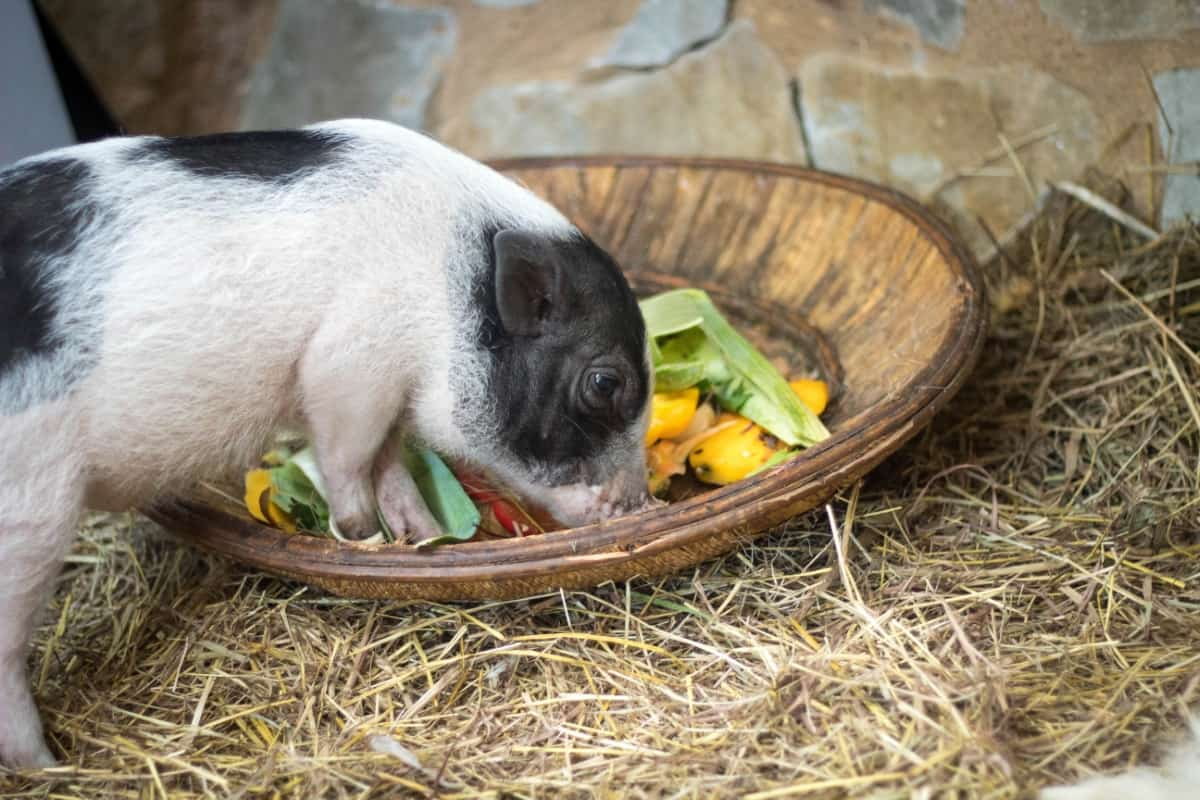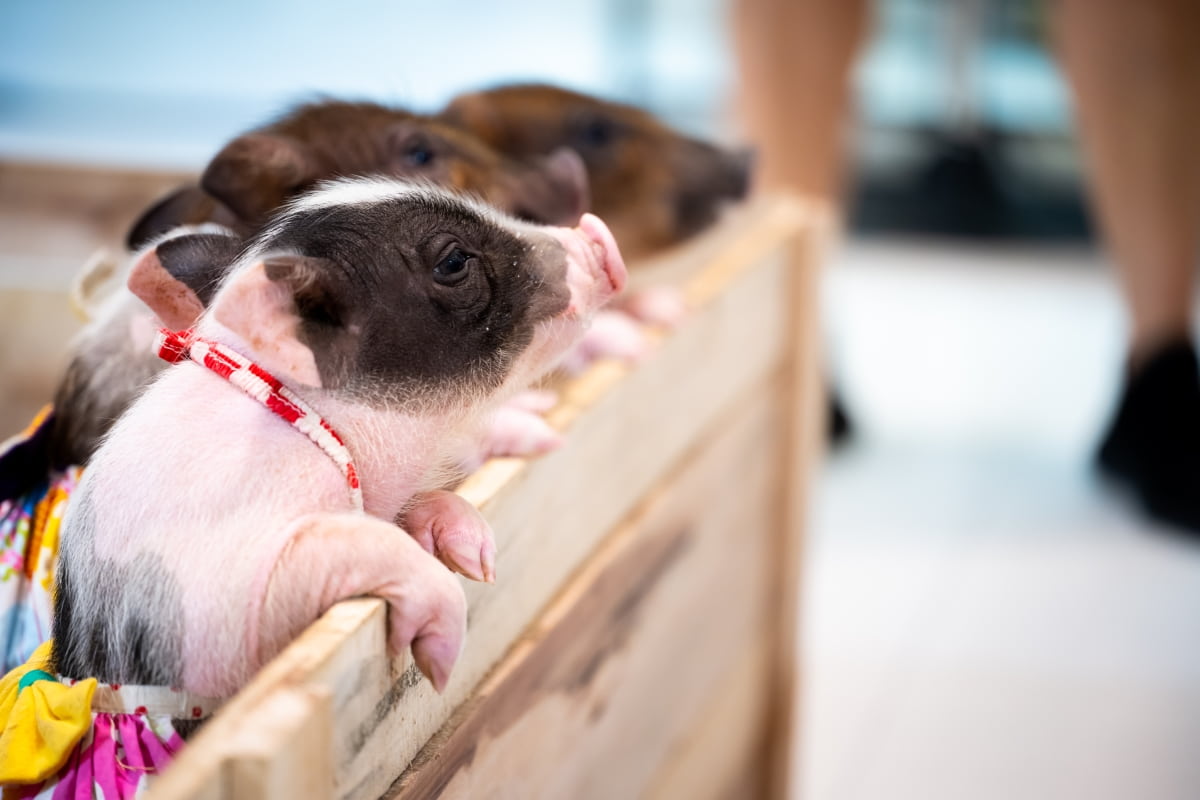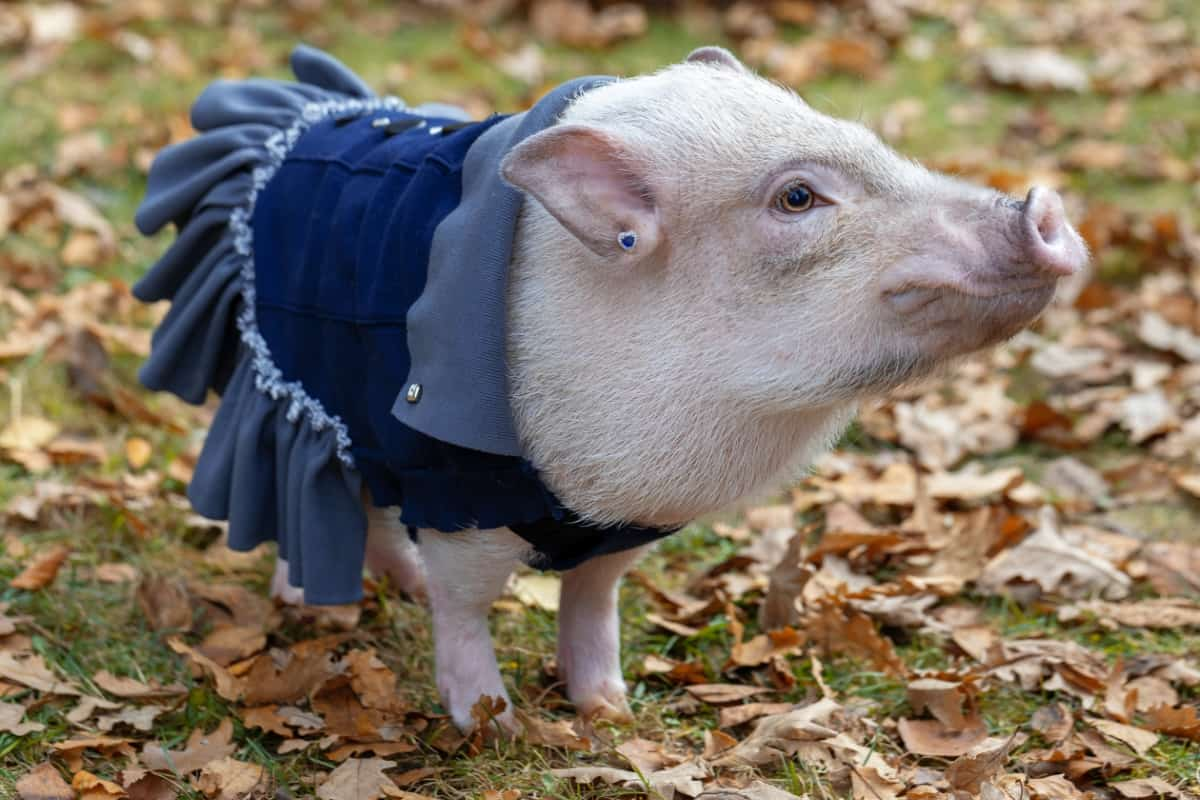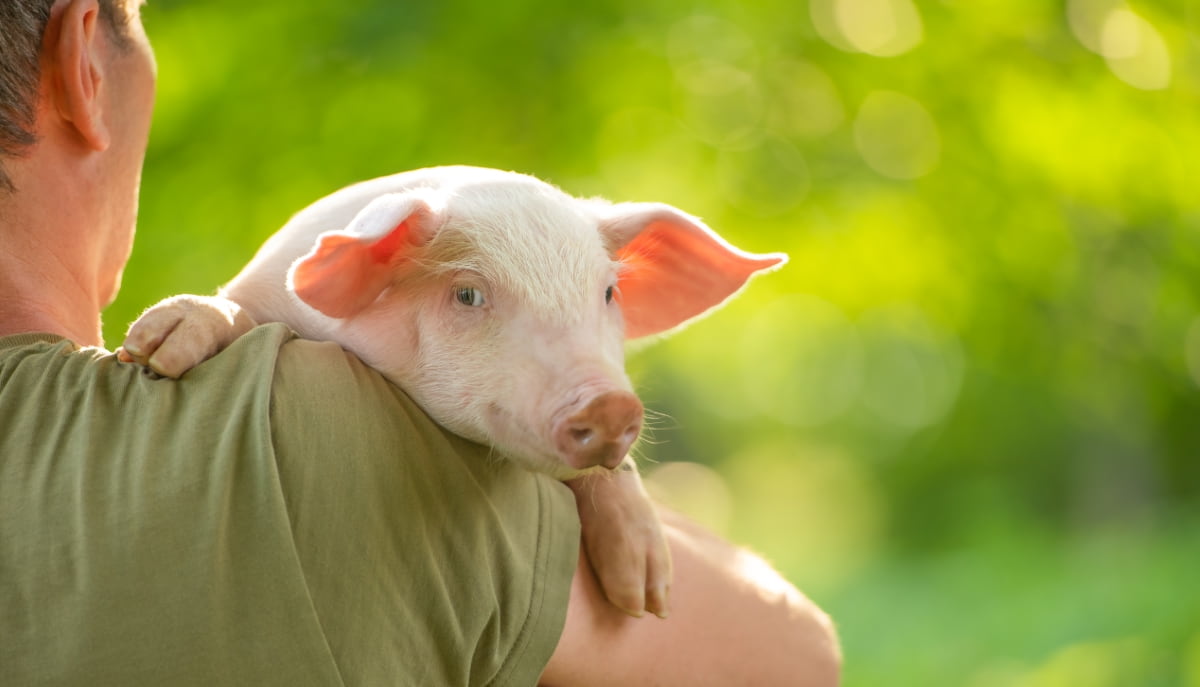Juliana pigs are delightful and intelligent animals that can make wonderful companions for those willing to provide them with the care and attention they need. Remember to always prioritize their well-being by providing proper nutrition, exercise, mental stimulation, and regular veterinary check-ups. With the right care and love, your Juliana pig can bring joy and laughter into your life for many years to come.

Introduction to Juliana Pigs
Origin and History of Juliana Pigs: Juliana pigs have a fascinating history rooted in their origins in Europe. These adorable creatures were selectively bred to be smaller versions of traditional farm pigs. With their compact size and charming appearance, Juliana pigs have captured the hearts of many animal lovers around the world.
Physical Characteristics and Size: In terms of physical characteristics, Juliana pigs typically weigh between 40 to 80 pounds and stand around 10-16 inches tall at the shoulder. Their coats come in a variety of colors, including black, white, red, and spotted patterns.
Juliana Pig Price: The cost of a Juliana pig can range from $500 to $3,000, with the price influenced by the pig’s age, size, coloration, and breeder reputation.
Juliana Pig Lifespan: Juliana pigs have an impressive lifespan compared to other pig breeds. On average, Juliana Pig’s Lifespan is anywhere from 12 to 18 years when properly cared for.
Understanding Juliana Pig Behavior
Social and Intelligent Nature
Juliana pigs are known for their social and intelligent nature. These miniature pigs thrive on interaction with humans and other animals, making them great companions. They enjoy being part of the family dynamic and can form strong bonds with their owners.
Common Behavioral Traits and How to Manage Them
One common behavioral trait of Juliana pigs is their curiosity. They love to explore their surroundings and will often investigate new objects or areas in their environment. Providing them with mental stimulation through toys or puzzles can help keep them engaged. Consistent training using positive reinforcement techniques is key to shaping desirable behaviors.
Housing Requirements for Juliana Pigs
Indoor Living Spaces
For indoor living spaces, make sure there is enough room for your pig to move around freely. Consider using soft bedding for their comfort.
Outdoor Enclosures and Safety
Outdoor enclosures should be spacious with secure fencing to prevent escapes. Ensure there are shady areas for hot days and shelter from harsh weather conditions. Safety measures such as sturdy gates and locks are crucial always to keep your pig secure. Regularly inspect the enclosure for any potential hazards or escape routes. Creating a stimulating environment with toys and Mini Pig Enrichment Activities will keep your Juliana pig happy and mentally engaged.
In case you missed it: Ultimate Guide to Meishan Pig: Beed Facts, Breeding, Raising, and Care

Diet and Nutrition
Feeding Your Juliana Pig a Balanced Diet
When it comes to the Juliana Pig Diet, it’s essential to provide a balanced and nutritious meal plan. A healthy diet for a Juliana pig consists of high-quality pellets specifically formulated for miniature pigs. Additionally, fresh fruits and vegetables should be incorporated into their daily meals.
Foods to Avoid and Dietary Supplements
Foods like chocolate, avocado, onions, and dairy products should never be included in their diet as they can be toxic to pigs. It’s also important to monitor their portion sizes and not overfeed them, as obesity is a common issue among pet pigs.
Health Care and Wellness
Routine Veterinary Care for Juliana Pigs
When it comes to Mini Pig Care, routine veterinary care is crucial. Regular check-ups with a knowledgeable veterinarian who understands the unique needs of pigs can help ensure your pig stays healthy and happy. Look out for changes in appetite, behavior, or physical appearance that could indicate a potential health issue. Early detection is key to prompt treatment.
Recognizing Signs of Illness and Preventative Measures
Preventative measures play an important role in maintaining your Juliana pig’s well-being. This includes providing a balanced diet and a clean living environment. By taking proactive steps to prevent illness, you can help keep your pig healthy for years to come. Remember that each pig is unique and may have specific health requirements.
Training and Enrichment
Basic Training Techniques
Training and enrichment are essential for keeping your Juliana pig happy and mentally stimulated. Start with positive reinforcement techniques. Pigs are intelligent animals and can learn commands like sit, stay, and come.
Enrichment Ideas to Keep Your Pig Mentally Stimulated
Enrichment activities are key to preventing boredom in your pig. Provide them with toys that encourage rooting behavior or puzzle feeders to keep pigs’ minds active. Rotating toys regularly can prevent them from losing interest. Consider setting up a digging area where they can explore and root around safely. Additionally, hiding treats around their living space can provide mental stimulation as they search for goodies. Spending quality time interacting with your pig through playtime or Juliana Pig Training sessions strengthens your bond while keeping them engaged mentally.
Grooming and Hygiene
Bathing and Skin Care
When it comes to bathing, use a shampoo specifically formulated for pigs to avoid irritating their sensitive skin. Skin care is vital in maintaining your Miniature Pig Health. Regularly check for irritation, dryness, or parasites like mites. Address any concerns promptly with the guidance of a veterinarian.
Hoof and Dental Care
For hoof care, trim them regularly, as overgrown hooves can lead to discomfort and mobility issues. Dental care is often overlooked but crucial; provide chew toys or dental treats to help keep their teeth healthy and prevent dental problems.
In case you missed it: Ultimate Guide to Teacup Pigs: Raising, Diet, Lifespan, Cost, and Care

Breeding and Reproduction
Understanding the Breeding Process
Breeding Juliana pigs involves careful planning and consideration. Understanding the Juliana Pig Breeding is crucial to ensure a successful outcome. Pairing compatible pigs with desirable traits can lead to healthy offspring.
Caring for Pregnant Juliana Pigs and Newborn Piglets
Caring for pregnant Juliana pigs requires extra attention and specialized care. Providing a comfortable environment, proper nutrition, and regular veterinary check-ups are essential during this time. Monitoring their health and behavior closely is key to a successful pregnancy.
When the newborn piglets arrive, it’s important to create a warm and safe space for them to thrive. Ensuring they receive adequate colostrum from their mother will help boost their immune system. Regular monitoring of the piglets’ growth and development is vital in the early stages of life.
Legal Considerations and Zoning Laws
Knowing Your Local Pet Pig Regulations
When it comes to the Legalities of Owning a Juliana Pig, there are important legal considerations and zoning laws that you need to be aware of. Each locality may have specific regulations regarding the ownership of pet pigs, so it’s crucial to do your research before bringing a Juliana pig into your home. Some areas have restrictions on the Juliana Pig Size and type of animals allowed as pets.
Tips for Responsible Juliana Pig Ownership
In addition to zoning laws, responsible Juliana pig ownership also involves being prepared for the commitment that comes with caring for these intelligent animals. Pigs require proper Indoor Housing for Mini Pigs, nutrition, healthcare, and social interaction to thrive. By familiarizing yourself with local regulations and being proactive in providing excellent care for your Juliana pig, you can enjoy a fulfilling companionship while respecting the rules set forth by your community.
Adopting a Juliana Pig
Where to Find Juliana Pigs for Adoption
Adopting a Juliana pig can be a rewarding experience, but it’s essential to know where to find these adorable creatures. When looking for Juliana Pig Adoption, check local animal shelters or rescue organizations. Some breeders also offer pigs for adoption, so do your research and choose a reputable source. Before bringing your new pig home, make sure you have the right setup. Juliana pigs need ample space to roam and explore, both indoors and outdoors. Ensure their living area is secure and free from any potential hazards.
Preparing Your Home for a New Pig
Prepare your home by pet-proofing the environment and setting up a cozy sleeping area with bedding and blankets.
In case you missed it: Fengjing Pig Breed: Characteristics, Origin, History, Lifespan, Price, and Size

Conclusion
By understanding their behavior, providing a suitable environment, offering a balanced diet, ensuring regular health check-ups, implementing training techniques, and following legal regulations diligently, you can create a fulfilling life for your beloved pet. With the right information and commitment to responsible ownership practices, you can enjoy many happy years together with your pint-sized porcine companion.
Note: The images presented in this post are intended solely for representation purposes. The images are meant to serve as visual aids and should not be relied upon as accurate representations of their real-life counterparts.
- Feed Your Flock for Less: Top 10 Tips to Save on Chicken Feed
- Ultimate Guide to Ossabaw Island Hog: Breeding, Raising, Diet, and Care
- Hatching Answers: The Top 10 Reasons Your Chickens Aren’t Laying Eggs
- Eggs and Economics: Breaking Down the Cost of Raising Backyard Chickens
- Defend Your Greens: Proven Methods to Keep Iguanas Out of Your Garden
- Ultimate Guide to Cinnamon Queen Chicken: A Comprehensive Guide for Beginners
- Ultimate Guide to California Tan Chicken: Breeding, Raising, Diet, Egg-Production and Care
- Ultimate Guide to Marsh Daisy Chicken: Breeding, Raising, Diet, and Care
- 10 Types of Chicken Farming Businesses You Can Start for Profits